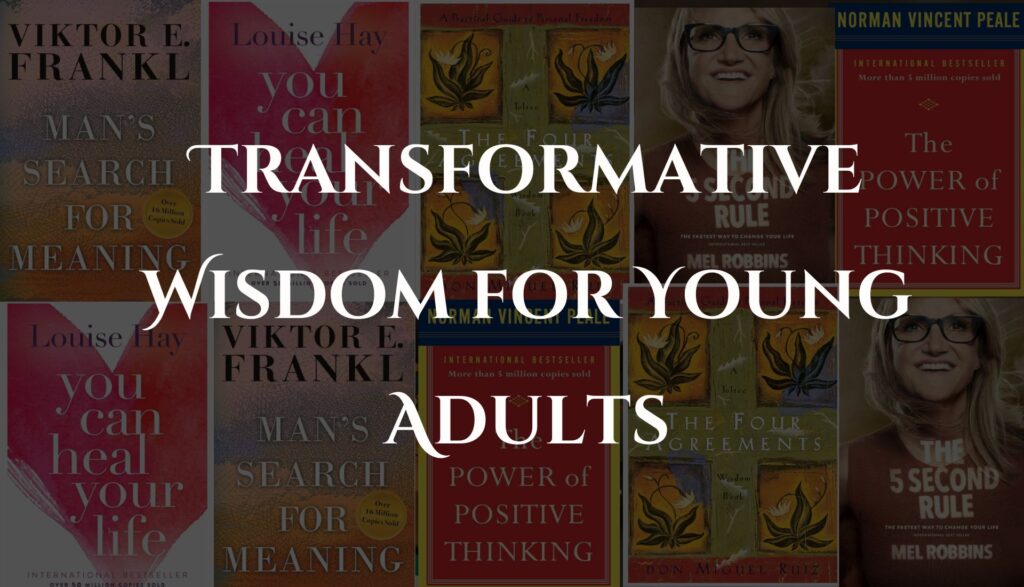In the epoch of emerging adulthood, individuals confront a myriad of hurdles, spanning from scholastic demands to vocational choices and interpersonal connections. The imperative for counsel and bolstering in this metamorphic interval renders self-help literature an indispensable reservoir. These literary companions not only furnish perspectives on manoeuvring through life’s intricacies but also endow young adults with the prowess to cultivate pivotal skills and mindsets, charting a course toward a prosperous future.
- You Can Heal Your Life by Louise Hay
- Man's Search for Meaning by Viktor E. Frankl
- The Four Agreements: A Practical Guide to Personal Freedom by Don Miguel Ruiz
- The Power of Positive Thinking by Norman Vincent Peale
- The 5 Second Rule: Transform your Life, Work, and Confidence with Everyday Courage by Mel Robbins
1. You Can Heal Your Life by Louise Hay
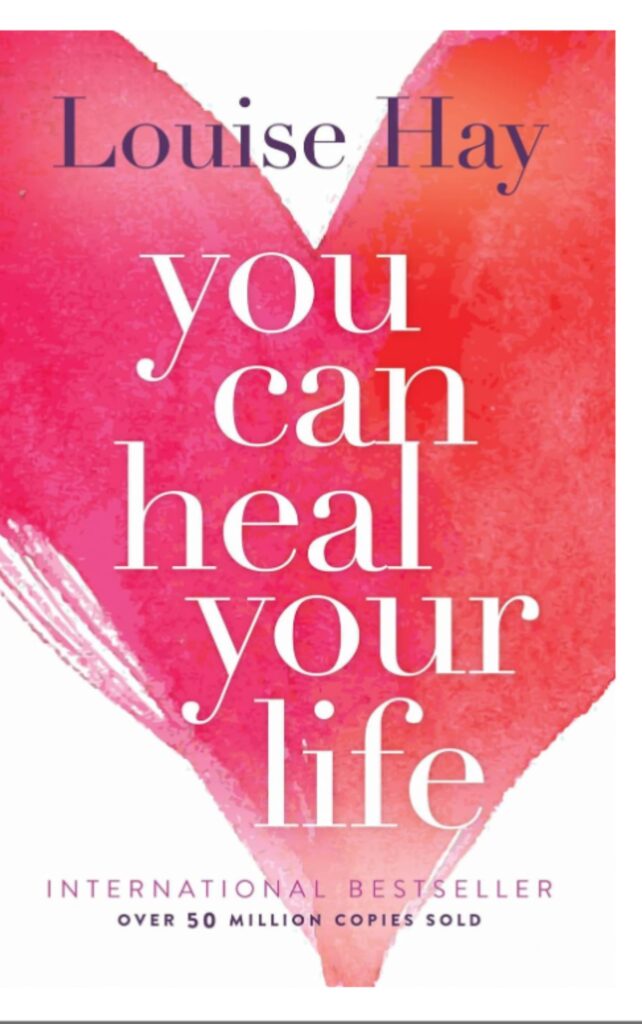
Louise Hay’s “You Can Heal Your Life” stands as a beacon in the realm of self-help literature, unfurling the profound interplay between thoughts and physical well-being. Originating in 1984, the book garnered widespread acclaim for its holistic approach to healing and personal evolution. Louise Hay, a distinguished motivational wordsmith and orator, unveils her personal odyssey of conquering adversities and reshaping her existence through the potency of optimistic cognition.
At the core of the book resides the notion that our thoughts and convictions wield substantial influence over our holistic welfare. Louise Hay introduces the concept that numerous physical maladies and infirmities are entwined with underlying emotional and mental paradigms. Through the identification and alteration of negative thought patterns, individuals can commandeer their health and instigate positive transformations in their life course.
A pivotal facet of the book underscores the author’s insistence on self-love and the assertion that we possess the capability to metamorphose our lives by reforming our thoughts. Hay acquaints readers with the realm of affirmations—constructive declarations that, when reiterated consistently, aid in reprogramming the mind and fostering recuperation. The book encapsulates an exhaustive manual encompassing diverse physical ailments and the corresponding cognitive patterns that might contribute to them, proffering affirmations and exercises for readers to incorporate into their daily routines.
“You Can Heal Your Life” has ascended to the echelons of a classic in the self-help genre, instigating numerous individuals to embrace a more positive mental framework and embark on proactive strides towards personal maturation and recuperation. The teachings of Louise Hay endure as a resonating force with readers seeking comprehension of the intricate link between mind and body and the harnessing of affirmative thinking for transformative metamorphosis.
2. Man's Search for Meaning by Viktor E. Frankl
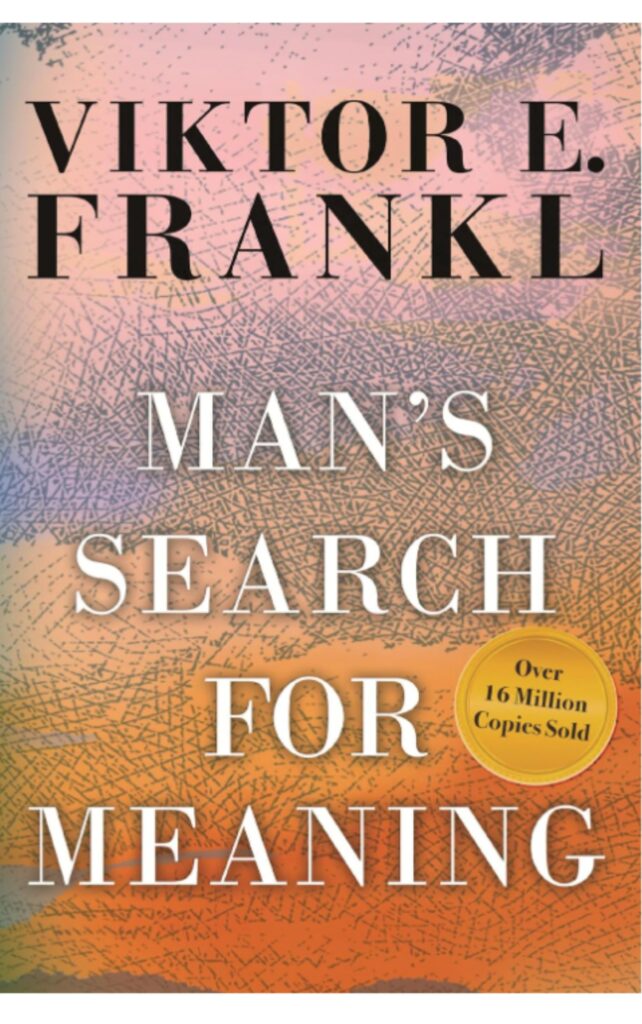
Viktor E. Frankl’s “Man’s Search for Meaning” stands as a profound and influential literary work delving into the author’s dual role as a Holocaust survivor and a psychiatrist. Originating in 1946, the book has etched its place as a classic in the realm of existential psychology, leaving an indelible mark on millions with its profound insights into the intricacies of the human condition.
The initial segment of the book unfolds Frankl’s personal ordeals as a captive in Nazi concentration camps during the tumultuous era of World War II, encompassing his tenure at Auschwitz. Despite grappling with profound suffering, incessant hunger, and the omnipresent specter of death, Frankl discerns a notable pattern: those who unearthed meaning and purpose in their existence displayed a greater capacity to endure the relentless adversities.
The subsequent section delineates Frankl’s psychological doctrine, coined as logotherapy, hinging on the premise that the primary impetus driving humans is the quest for meaning. As per Frankl, individuals can unearth purpose in their lives through diverse avenues, such as crafting a mission, undergoing love, or discovering significance in affliction.
The book accentuates the imperative of preserving an internal sense of liberty and actively electing one’s disposition when confronted with inescapable suffering. Frankl contends that even amid the most formidable circumstances, individuals retain the potency to govern their responses and uncover meaning, ultimately paving the way to a more gratifying and purpose-laden existence.
“Man’s Search for Meaning” resonates across global readership, persisting as a fount of inspiration for those grappling with adversity. The book prompts contemplation on the human aptitude to discern meaning and purpose in life, even within the crucible of unimaginable suffering, offering profound insights into the enduring resilience of the human spirit.
3. The Four Agreements: A Practical Guide to Personal Freedom by Don Miguel Ruiz
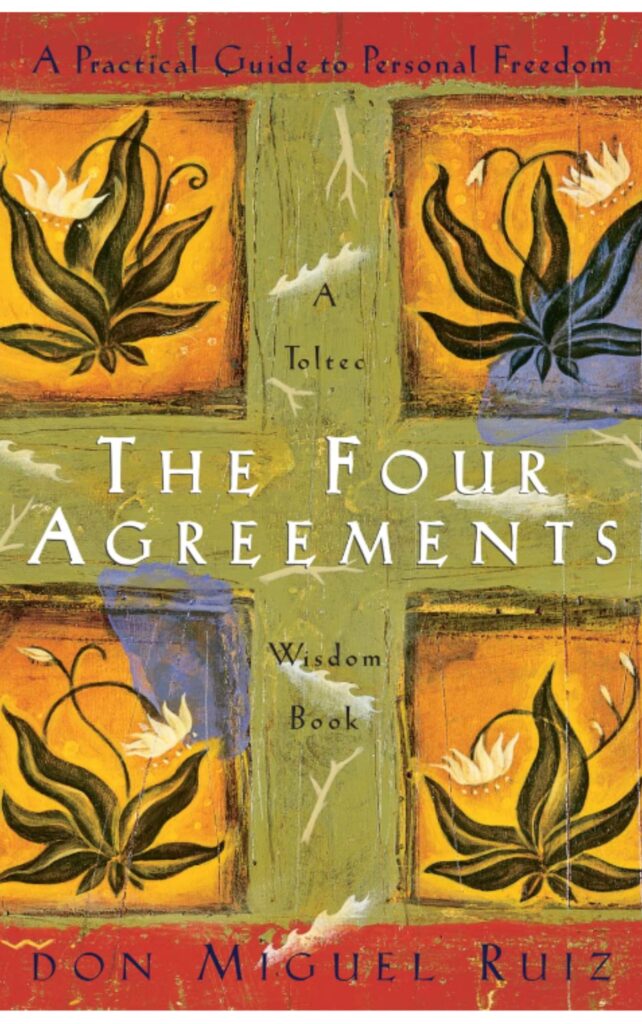
In the year 1997, Don Miguel Ruiz unveiled “The Four Agreements: A Practical Guide to Personal Freedom,” establishing its presence as a metamorphic jewel in the realm of self-improvement. Grounded in age-old Toltec sagacity, the tome imparts pragmatic counsel for navigating a life imbued with individual liberty and satisfaction. Its uncomplicated methodology and profound discernments have garnered widespread admiration.
At the heart of the tome lies a focal point consisting of four indispensable accords, urging individuals to forge a covenant with themselves to achieve personal emancipation:
Be Impeccable with Your Word: Ruiz emphasizes the influential nature of language, urging individuals to communicate with integrity. Being impeccable with your word involves steering clear of gossip, speaking truthfully, and utilizing language to foster positivity and love.
Don’t Take Anything Personally: Ruiz posits that people’s actions and words mirror their own beliefs and perceptions. By refraining from taking things personally, individuals liberate themselves from unwarranted suffering and sustain inner serenity.
Don’t Make Assumptions: The book accentuates the perils of making assumptions, as they often breed misunderstandings and needless conflicts. Ruiz champions open communication and the courage to pose questions for the sake of clarity.
Always Do Your Best: The author accentuates the significance of giving one’s best effort in any given moment, recognizing its variability from day to day. By consistently striving for excellence, individuals sidestep self-judgment and remorse.
Ruiz’s examination of these accords unfurls as a trajectory toward individual metamorphosis, enhanced relationships, and an elevated perception of emancipation. The tome intricately intertwines age-old sagacity with pragmatic guidance, guaranteeing its approachability and pertinence to a varied audience.
4. The Power of Positive Thinking by Norman Vincent Peale
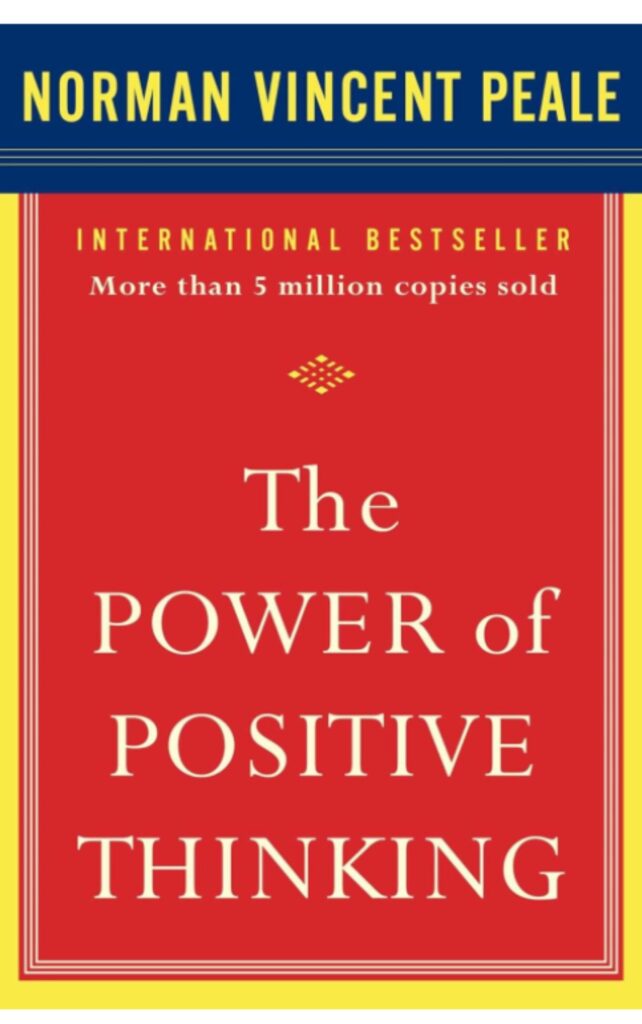
Norman Vincent Peale’s “The Power of Positive Thinking,” initially published in 1952, remains a cornerstone in the self-help realm. Dr. Peale, a clergyman and inspirational orator, unfolds a philosophy centering on the far-reaching influence of cultivating an optimistic mindset.
At the heart of the book lies the notion that one’s thoughts wield colossal sway over life’s unfolding events. Dr. Peale champions the adoption of a positive mental attitude as a formidable tool to surmount challenges, attain triumphs, and lead a gratifying existence. In his view, through the reconfiguration of thoughts, individuals possess the prowess to reshape the fabric of their reality.
Dispensing practical counsel and methodologies, Dr. Peale steers readers on the path to nurturing and sustaining a positive mindset. He advocates for the substitution of negative thoughts with affirmative declarations, the incorporation of visualization techniques for success, and the cultivation of unwavering belief in one’s capacities. Dr. Peale also underscores the significance of faith and proposes the integration of spirituality into daily life as a wellspring of fortitude and inspiration.
Throughout the narrative, Dr. Peale shares authentic anecdotes of individuals who underwent transformative odysseys by harnessing the potency of positive thinking. He imparts insights on stress management, fortitude building, and the cultivation of self-assurance.
“The Power of Positive Thinking” garners acclaim for its accessible and motivational prose. While some critics contend that it oversimplifies intricate matters, a multitude of readers discover inspiration and pragmatic wisdom applicable to various facets of their lives. The enduring vogue of the book attests to its profound influence on shaping the mindset of innumerable individuals striving for personal evolution and triumph.
5. The 5-Second Rule by Mel Robbins
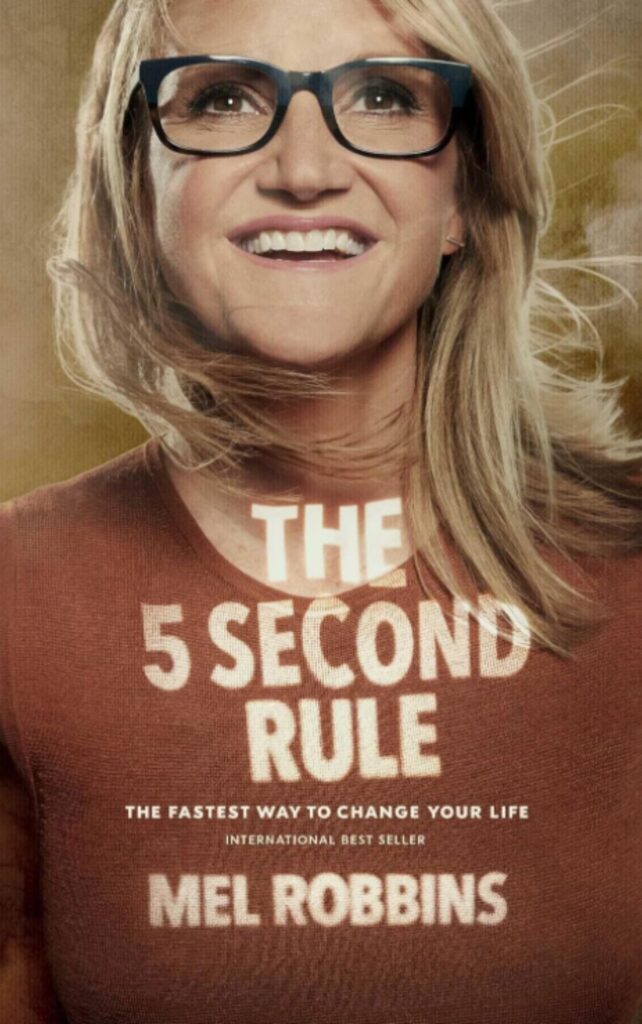
Mel Robbins’ “The 5 Second Rule: Transform Your Life, Work, and Confidence with Everyday Courage” stands as a self-help volume unveiling an uncomplicated yet potent method to surmount procrastination, self-doubt, and reluctance. Released in 2017, the tome provides a pragmatic strategy for promptly taking action and effecting constructive alterations across diverse facets of life.
The core concept of the 5 Second Rule revolves around the idea that when you have an impulse to act on a goal or make a decision, you must take action within five seconds, or your mind will kill the idea. Robbins argues that by counting backward from five to one and physically moving or taking a small action, you can interrupt negative thought patterns and activate the prefrontal cortex, which is associated with decision-making and goal-directed behavior.
The book furnishes concrete instances and narratives, weaving in the author’s firsthand experiences, to expound on how the 5 Second Rule can fortify confidence, dismantle detrimental habits, enrich relationships, and elevate general well-being. Robbins encourages readers to wield the rule as a tool for nurturing affirmative practices, overcoming trepidation, and nurturing the courage to pursue their ambitions.
Beyond the pragmatic application of the 5 Second Rule, the tome confronts common challenges individuals confront in their personal and professional realms. It underscores the significance of immediate action in instigating positive transformations and spotlights the impact of minute decisions on one’s overall happiness and success.
“The 5 Second Rule” has struck a chord with a wide-ranging audience owing to its simplicity and efficacy. Readers have discovered inspiration and impetus to surmount obstacles and embark on daring endeavours to attain their objectives. The book’s accessible demeanour and actionable counsel render it a priceless asset for individuals aspiring to metamorphose their lives through everyday courage
Within the realm of self-help literature lies a repository of sagacity and counsel tailored for the younger generation. Manoeuvring through the trials of young adulthood becomes more navigable with the discernments and pragmatic counsel proffered by these literary works. Whether it pertains to nurturing mindfulness, attaining triumph in one’s career, cultivating relationships, or embracing diversity, the preeminent self-help books for young adults emerge as indispensable comrades on the odyssey of self-discovery.

